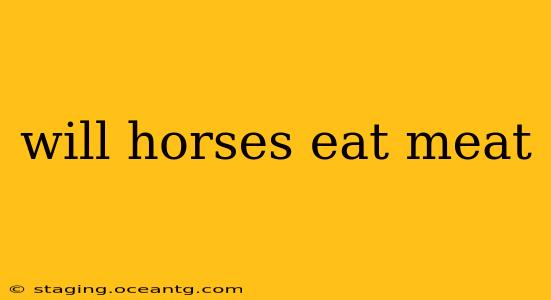Horses are herbivores, meaning their digestive systems are specifically designed to process plant-based materials. The overwhelming majority of a horse's nutritional needs are met through grazing and hay, consisting of grasses, legumes, and other plant matter. While the question of whether horses will eat meat might seem simple, understanding their dietary needs and evolutionary adaptations offers a more nuanced answer.
Are Horses Obligate Herbivores?
Yes, horses are considered obligate herbivores. This means their bodies are physiologically adapted to digest and utilize plant matter efficiently. Their long digestive tract, specialized teeth for grinding vegetation, and microbial fermentation in their hindgut all point to a herbivorous lifestyle honed over millions of years. Their bodies are not equipped to efficiently digest or process meat.
What Happens If a Horse Eats Meat?
While a horse might try to eat meat if presented with it, their digestive system isn't designed for it. They lack the necessary enzymes and stomach acid to break down protein efficiently from animal sources. Consuming meat can lead to several potential problems:
- Digestive Upset: Meat can cause diarrhea, colic, and other digestive issues due to the difficulty their bodies have in processing it.
- Nutritional Imbalance: A meat-based diet will not provide the essential nutrients a horse needs to thrive, leading to deficiencies.
- Parasites: Raw meat can carry parasites that can infect the horse.
Why Don't Horses Eat Meat in the Wild?
In their natural habitat, horses graze on grasses and other readily available plants. Their evolutionary path has favored the development of a digestive system perfectly suited for this type of diet. Meat is a less accessible and less reliable food source, requiring energy expenditure in hunting or scavenging, which isn't efficient for their lifestyle.
Why Might a Horse Seem to Eat Meat?
There are a few instances where a horse might consume meat, but it's usually not due to a natural craving:
- Curiosity: A horse might investigate a piece of meat out of curiosity, and might even take a small bite. However, this is rarely followed by continued consumption.
- Accidental Ingestion: A horse might accidentally consume some meat if it's mixed in with their feed.
- Nutrient Deficiency (Extreme Cases): In extreme cases of severe malnutrition, a horse might try to eat meat if it’s the only available food source, but this is a sign of serious neglect and a dangerous situation.
Can Horses Benefit from Meat-Derived Supplements?
While horses shouldn't consume raw meat, some commercially available equine supplements might contain meat-derived protein sources, such as hydrolyzed protein. These are highly processed and much easier for the horse’s digestive system to handle. It's crucial to choose high-quality supplements from reputable brands and consult with a veterinarian before introducing any new supplements to a horse's diet.
In conclusion, while a horse might nibble on meat out of curiosity or desperation, it's not part of their natural diet, and doing so can have negative health consequences. Maintaining a proper, plant-based diet is crucial for their overall health and well-being.
